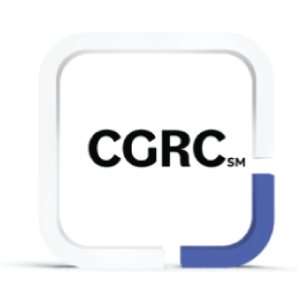
The CGRC certification is targeted at professionals who have responsibilities related to governance, risk management, and compliance within organizations. This includes roles such as risk managers, compliance officers, IT auditors, information security managers, and senior management executives.
Duration: 4 Days
$1,995.00
The CGRC certification is targeted at professionals who have responsibilities related to governance, risk management, and compliance within organizations. This includes roles such as risk managers, compliance officers, IT auditors, information security managers, and senior management executives.
The CGRC certification exam covers several domains, each representing a different aspect of governance, risk management, and compliance:
The ISC² Certified in Governance, Risk Management, and Compliance (CGRC) certification offers numerous benefits for professionals working in the field of cybersecurity, risk management, and compliance:
Overall, the ISC² Certified in Governance, Risk Management, and Compliance (CGRC) certification offers numerous benefits for professionals seeking to enhance their skills, advance their careers, and make a positive impact in the field of governance, risk management, and compliance.
The ISC² Certified in Governance, Risk Management, and Compliance (CGRC) certification is designed for professionals who play key roles in managing and mitigating risks within organizations, particularly in the context of cybersecurity and information security.
The CGRC certification validates the skills and knowledge required to effectively manage governance, risk management, and compliance (GRC) processes within organizations. It covers a wide range of topics related to governance, risk assessment, regulatory compliance, and implementing controls to mitigate risks.
The CGRC certification is targeted at professionals who have responsibilities related to governance, risk management, and compliance within organizations. This includes roles such as risk managers, compliance officers, IT auditors, information security managers, and senior management executives.
The CGRC certification exam covers several domains, each representing a different aspect of governance, risk management, and compliance:
The ISC² Certified in Governance, Risk Management, and Compliance (CGRC) certification offers numerous benefits for professionals working in the field of cybersecurity, risk management, and compliance:
Validation of Expertise: CGRC certification validates professionals’ expertise in governance, risk management, and compliance (GRC) processes within organizations. It demonstrates their proficiency in implementing effective strategies to manage risks, comply with regulations, and uphold governance principles.
Industry Recognition: CGRC certification is globally recognized and respected within the cybersecurity and information security industry. Achieving CGRC certification enhances professionals’ credibility and reputation as skilled GRC practitioners.
Career Advancement Opportunities: CGRC certification opens up new career opportunities for professionals in roles such as risk managers, compliance officers, IT auditors, information security managers, and senior management executives. Certified individuals may qualify for higher-level positions with increased responsibilities and higher salaries.
Employer Preference: Many employers prefer or require candidates to hold industry-recognized certifications like CGRC when hiring for GRC-related roles. Having CGRC certification can give candidates a competitive edge in the job market and increase their chances of being hired for desirable positions.
Skill Development: Pursuing CGRC certification helps professionals develop advanced skills and knowledge in governance, risk management, and compliance. The certification covers a wide range of topics, including risk assessment methodologies, regulatory compliance requirements, control frameworks, and incident response planning.
Continuing Education and Renewal: CGRC certification requires professionals to engage in continuing professional education (CPE) activities to maintain their certification. This encourages ongoing learning and professional development, ensuring that certified professionals stay current with the latest trends, technologies, and best practices in GRC.
Networking Opportunities: Becoming certified in CGRC connects professionals with a global community of GRC experts, practitioners, and industry leaders. Networking with other certified professionals can provide valuable insights, support, and collaboration opportunities in the GRC field.
Overall, the ISC² Certified in Governance, Risk Management, and Compliance (CGRC) certification offers numerous benefits for professionals seeking to enhance their skills, advance their careers, and make a positive impact in the field of governance, risk management, and compliance.
Professional Experience: Candidates must have a minimum of two years cumulative work experience in one or more of the seven domains of the CGRC CBK. This may include experience in risk management, compliance management, auditing, information security management, or related fields.
Knowledge of GRC Principles: Candidates should have a strong understanding of governance, risk management, and compliance principles, frameworks, and best practices. This includes knowledge of relevant standards, regulations, and industry guidelines related to GRC.
Advanced Education or Training: While not explicitly required, candidates with advanced education or training in GRC-related fields may have an advantage. This could include a bachelor’s or master’s degree in fields such as cybersecurity, risk management, compliance, business administration, or a related discipline.
Industry Certifications: Candidates may benefit from holding other relevant certifications in GRC, cybersecurity, risk management, or related areas. Examples of relevant certifications include Certified Information Systems Security Professional (CISSP), Certified Information Security Manager (CISM), Certified Information Security Auditor (CISA), and others.
Understanding of Legal and Regulatory Frameworks: Candidates should have a basic understanding of legal and regulatory frameworks related to cybersecurity, privacy, data protection, and other areas relevant to GRC. This includes knowledge of laws, regulations, and industry standards such as GDPR, HIPAA, SOX, PCI DSS, and others.
Professional Ethics: Candidates should be familiar with professional ethics and codes of conduct relevant to the GRC profession. This includes understanding ethical responsibilities related to confidentiality, integrity, and professionalism.
4 days
$1,995.00
In just 7 days, you’ll discover your potential, elevate your confidence, and determine if you’re truly prepared to achieve certification, advancement, and reward—through an engaging self-assessment challenge crafted specifically for ambitious IT professionals.

@ Copyright SteppingStone Solutions, Inc. 2024-2025 All Rights Reserved